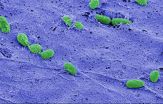Long-term, continuous use of low-dose aspirin and nonaspirin nonsteroidal anti-inflammatory drugs (NSAIDs) is associated with decreased colorectal cancer risk. The findings of a population-based, case-control study are published in Annals of Internal Medicine.
Colorectal cancer is the third most common non-skin cancer in the world. Colorectal neoplasms have a long progression, making colorectal cancer an obvious target for preventive interventions. Studies have suggested that regular aspirin and other NSAID use can reduce colorectal cancer risk, but a recent comprehensive review concluded that more research is needed to determine the optimal use of aspirin for cancer prevention.
Researchers reviewed data on drug use, comorbid conditions, and history of colonoscopy from prescription and patient registries in Northern Denmark. Based on prescriptions filled, taking 75 to 150 mg of aspirin continuously for five years or longer was associated with a 27 percent reduced risk for colorectal cancer and five or more years of continuous nonaspirin NSAID use was associated with a 30 to 45 percent reduction in colorectal cancer risk. Nonaspirin NDAIDS with the highest COX-2 selectivity were associated with the largest risk reductions.
The authors caution that patients with the highest adherence comprised only about 2 to 3 percent of all low-dose aspirin users in the study population, and these persons may have a risk profile for colorectal cancer that differs from that of the general population. In addition, other lifestyle factors were not measured.
Notes: For an embargoed PDF and author contact information, please contact Cara Graeff.
2. Corticosteroid injections offer little or no relief to some with low back pain Free abstract: http://www.annals.org/article.aspx?doi=10.7326/M15-0934
Corticosteroid injections offer limited or no relief from radiculopathy and spinal stenosis, two conditions that cause radiating low back pain. A systematic evidence review is published in Annals of Internal Medicine.
Epidural corticosteroids are commonly and increasingly used to treat radiculopathy and spinal stenosis, despite conflicting conclusions regarding their effects. Researchers review of 30 placebo-controlled trials examining the short- and long-term effects of epidural corticosteroids on pain, function, and risk for surgery in patients with radiculopathy and spinal stenosis.
For radiculopathy, epidural corticosteroids were associated with greater immediate improvement in pain intensity compared to placebo, but effects were small and short-lived. There seemed to be no effect on preventing surgery in the long-term. For spinal stenosis, epidural corticosteroids seemed to have no clear effect on patient outcomes.
Note: The URLs, including video link, will be live when the embargo lifts. For an embargoed PDF, please contact Cara Graeff. To interview the lead author, Dr. Roger Chou, please contact Tamara Hargens-Bradley at news@ohsu.edu or 503-494-8231.
3. Aspirin study will test new method for conducting pragmatic clinical trials Free abstract: http://www.annals.org/article.aspx?doi=10.7326/M15-1460
An upcoming study comparing two doses of aspirin for secondary prevention of cardiovascular events in high-risk patients will answer an important clinical question while simultaneously testing a new approach to conducting pragmatic clinical trials. The authors of a commentary in Annals of Internal Medicine explain the significance of this effort.
Known as ADAPTABLE (Aspirin Dosing: A Patient-Centric Trial Assessing Benefits and Long-Term Effectiveness), the trial is the first to be facilitated by the National Patient-Centered Clinical Research Network (PCORnet). PCORnet is a "network of networks" created by the Patient-Centered Outcomes Research Institute (PCORI) to overcome the challenges that make medical research expensive, inefficient, and slow to provide results. The mission of PCORnet is to support rapid and efficient randomized comparative effectiveness trials embedded in the delivery of usual care. In the ADAPTABLE trial, health record data collected during usual care will be used to identify, recruit, and follow up with research participants. Once the study is complete, researchers will have answers about aspirin and a better understanding of PCORnet's capacity to accomplish its core mission.
Note: The URLs, including video link, will be live when the embargo lifts. For an embargoed PDF, please contact Cara Graeff. To interview the lead author, Dr. Adrian Hernandez, please contact Sarah Avery at sarah.avery@duke.edu or 919-660-1306.
Also in this issue:
Cost-Effectiveness of Adding Cardiac Resynchronization Therapy to an Implantable Cardioverter-Defibrillator Among Patients With Mild Heart Failure Christopher Y. Woo, MD; Erika J. Strandberg, MS; Michelle D. Schmiegelow, MD; Allison L. Pitt, MS; Mark A. Hlatky, MD; Douglas K. Owens, MD, MS; and Jeremy D. Goldhaber-Fiebert, PhD Original Research M14-1804 Free abstract: http://www.annals.org/article.aspx?doi=10.7326/M14-1804
Intravenous Artesunate for the Treatment of Severe and Complicated Malaria in the United States: Clinical Use Under An Investigational New Drug Protocol Patrick S. Twomey, MD; Bryan L. Smith, MD; Cathy McDermott, RN, MPH; Anne Novitt-Moreno, MD; William McCarthy, PhD; S. Patrick Kachur, MD; and Paul M. Arguin, MD Original Research M15-0910 Free abstract: http://www.annals.org/article.aspx?doi=10.7326/M15-0910
Global Noncommunicable Disease Research: Opportunities and Challenges Lindsay M. Jaacks, PhD; Mohammed K. Ali, MBChB, MSc, MBA; John Bartlett, MD; Gerald S. Bloomfield, MD, MPH; William Checkley, MD; Thomas A. Gaziano, MD, MSc; Douglas C. Heimburger, MD, MS; Sandeep P. Kishore, MD, PhD; Racquel E. Kohler, PhD, MSPH; Kasia J. Lipska, MD, MHS; Olivia Manders, MA; Christine Ngaruiya, MD, DTM&H; Robert Peck, MD, MS; Melissa Burroughs Pena, MD, MS; David A. Watkins, MD, MPH; Karen R. Siegel, PhD, MPH; and K.M. Venkat Narayan, MD, MSc, MBA Ideas and Opinions M15-1068 Free abstract: http://www.annals.org/article.aspx?doi=10.7326/M15-1068
Hospital-Based Violence Prevention: Progress and Opportunities Jonathan Purtle, DrPH, MSc; John A. Rich, MD, MPH; Joel A. Fein, MD, MPH; Thea James, MD; and Theodore J. Corbin, MD, MPP Ideas & Opinions M15-0586 Free abstract: http://www.annals.org/article.aspx?doi=10.7326/M15-0586 For an embargoed PDF, please contact Cara Graeff (cgraeff@acponline.org or 215-351-2513) or Angela Collom (acollom@acponline.org or 215-351-2514).
INFORMATION:

